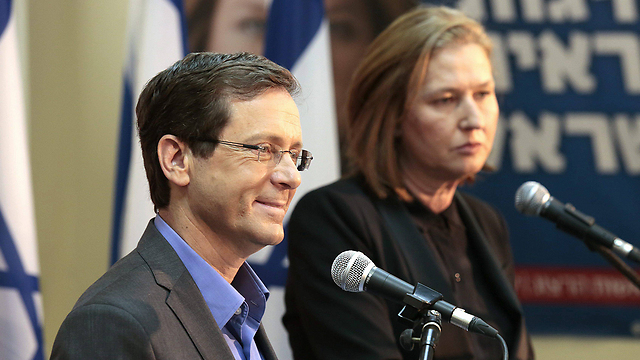
Netanyahu's delicate coalition dance
Analysis: With both the parties he needs and his own Likud MKs clamoring for what they see as their deserved portfolios, the prime minister must make everyone happy – but does he have a coalition ace up his sleeve?
This week's crisis in coalition talks with Moshe Kahlon and his Kulanu party is only the first in a list of looming crises in the negotiations on the formation of the next government.
There is a belief that the number of seats won by the Likud and the undisputed power of Benjamin Netanyahu would prevent such crises: No one wants more elections, and the coalition partners must accept what Netanyahu gives them. But this is a mistake.
Despite his strength, Netanyahu is dependent on those who will make up his coalition. No Kahlon and no Bennett means no government. And without Yisrael Beytenu's Avigdor Lieberman, he has a narrow government that will not last.

It was impossible not to think how it would look if Herzog, and not Netanyahu, had been standing there waiting to be tasked by Rivlin with forming the next government. Reuven Rivlin, a candid man who could never hide his feelings, barely looked at Netanyahu. His body language clearly said how he feels about the man who stood in front of him.
The chilliness, not to mention the president's reluctance, almost made redundant Rivlin's criticism of the prime minister, which oozed from every word. From the comments he made a few hours earlier to Salim Jubran, the chairman of the Central Elections Committee, that "Those afraid of votes at the polls will end up with stones thrown in the streets," to the tone of his speech, in which he outlined the three critical tasks facing the next government and the Knesset.
The missions outlined by Rivlin were interpolated with harsh criticism of the prime minister: The first task was to repair relations between Israel and the United States (in other words, the relationship that you, Bibi, managed to destroy); the second task was to restore stability to the political system (stability that you, Bibi, managed to destroy) and restore public confidence (trust that you, Bibi, lost during your last six years in office); and the third task was to heal the wounds and painful rifts that have accumulated in recent years (years that you, Bibi, served as prime minister) and only intensified during these elections (when you, Bibi, stopped at nothing - including propaganda and incitement - to ensure your own victory).
Even those who are unaware of the difficult history between the two - in particular the fact that if it had been up to Netanyahu, Rivlin would not have been standing there as president - could not help but notice the lack of affection between the two. Even Netanyahu's attempt at intimacy, as he reminded Rivlin of their longstanding familial connection ("I knew your brother and you knew my brother ") did not really move Rivlin.
Netanyahu's speech was a total reversal of the comments he made just nine days earlier. The viewers at home, those who were not in Netanyahu's camp, that is - the left, the Arabs, all these non-Zionists - could for a moment feel as they would have done had the prime minister not incited against them.
If they closed their eyes, they could experience a few seconds of a prime minister for all, a prime minister who says he is aware of the responsibility he bears, who views himself as the prime minister of each and every one of us, those who vote for him and those who did not, who promises to heal the rifts between sectors of Israeli society, who talks about equal rights for all citizens, regardless of race, religion or gender.
Even the challenges Netanyahu presented took on normal dimensions. Suddenly he was talking again about peace, and that life itself is not only Iran, but also the high cost of living and the cost of housing, and recognition of the need to preserve the friendship with the United States. Granted, there was still the need to express opposition to the agreement with Iran, but it was low-key, and without the usual fear-mongering. On the contrary, all of a sudden we have a partner; we have partners in the Arab states of the region.
What a difference nine days make.
Phyrric victory
The wish expressed by the president for a unity government is not wholly delusionary. Buji (Isaac Herzog) is waiting by the phone, sources on the left and right said this week. Herzog would love to join the government, they surmised, and was going crazy that no one was calling. It appears that the denials coming from Zionist Union about a unity government have not impressed anyone.It is also doubtful that anyone bought Herzog's message to the party leaders intending to join the Netanyahu government - that he is not a negotiating chip for Bibi and they should not be impressed by Netanyahu's spin.
So why is no one persuaded? And why do leaders of the coalition parties refuse to relax and why are they convinced that Netanyahu is preparing a surprise for them? Perhaps Herzog would like to join the government. And perhaps Netanyahu is leaving him hanging on purpose, to bring him in under more favorable conditions. But it is also true to say that there is currently no secret communication between Netanyahu or his office and Herzog or his camp.

It takes time to absorb the size of such a defeat. Perhaps Herzog secretly hoped that someone would trigger the establishment of a different government. Kahlon, for example. After all, without Kahlon, Netanyahu has no government.
What would have happened if Kahlon had recommended himself as prime minister? In such circumstances, the Zionist Union, Yesh Atid, Lieberman, Meretz and even the religious parties could have supported him.
But all this was just a pipe dream. Kahlon rejected the idea out of hand. How could anyone with 10 seats out himself forward as prime minister? It was ludicrous.
If the result had been a draw, I would not have rejected the proposal out of hand, said Shelly Yacimovich, once a great opponent of a unity government. If the two parties had been the same size, there might have been room to think about it, she said. But when it became clear that this was not the case, that the Likud had received a greater vote of confidence than in the previous elections, and that there was going to be a right-wing government – it became a moot point.
Under such conditions, she said, there was not going to be a unity government. It was going to be a right-wing government. And the members of the Labor Party - as Yacimovich insists on calling the Zionist Union – would never agree to it.
So perhaps what we are now witnessing is too great a win by the prime minister. If there had been a lesser success, he could have formed the government he actually wanted. After all, no one is in any doubt that if Netanyahu could choose between Bennett and Lieberman and Herzog and Livni, he would have preferred the latter option.
In the days since the election, the ill wind that has been blowing from America shows what still awaits Israel from its ally – and only reinforces the need for a more moderate government. Netanyahu has allowed himself to stick a finger in the eye of the US president who is now at the peak of its popularity (44 percent approval, according to a Gallup poll). And just to drive home the scale - Congress has a meager 15-percent approval rating.
The Wall Street Journal report that Israel was spying on the United States, and the storm that followed, proves that Israel has become a controversial issue in the United States, along with hot topics such as abortion or guns.
We will know soon enough just how bad things are, someone familiar with the relationship with the Americans told me this week. The Israeli soccer team plays Wales on Saturday and Belgium on Tuesday in qualifiers for Euro 2016, which will be held in France. Israel has never qualified and now has a real chance.
But some have been making dark predictions that by 2016 there will be sanctions against Israel, and nothing could be easier than to ban Israel from the tournament. It would be just our luck, the source said, that when we do qualify, we can't play.
Ticking clock
If there had been a post-election sense that the job was done, and there would be a government in no time, it is now clear that Netanyahu will need every one of the 28 days at his disposal - and another 14 days if he asks for an extension. Every single one of those 42 days will present a new crisis and more spin aimed at putting pressure on the parties, to obfuscate what is going on behind the scenes.The business of coalition-forming is far more complex than it seems. Each one of the potential partners has promised his voters certain gains, and nobody trusts Netanyahu.
The conversation between Netanyahu and Lieberman was to the point, and emotion was left at the door. Lieberman can be trusted to clearly state his demands, and to tell Netanyahu in private what he says in public: If he does not get what he wants, he has no problem with joining the opposition. After all, you do not need me, he says disingenuously, and you can form a government without me.
For now, it seems that Lieberman will hold on to the foreign affairs portfolio. Ironically, Lieberman is the only one in any possible formulation of the government who has actually dealt with the Americans. Who would have thought that the US would be praying for Avigdor Lieberman?
Over at Bayit Yehudi, the party's Knesset members are planning to take Bennett's head. After their election failure they do not see any reason for Bennett to hold on to the wide-ranging powers he has claimed for himself. They will try to make this into an ideological battle: Our electorate does not need the Foreign Ministry, they say. Housing, education, settlement, transportation - these are the things that Bayit Yehudi requires.
But the difficult negotiations with other parties are nothing compared to the headache waiting for Netanyahu in his own Likud party, which he is leaving to the end. The tensions within the party, with 30 seats in hand, have only intensified as the days pass.
It is important to understand that not everyone within the Likud is happy with Netanyahu's victory. There are many who had been thinking about their own positions should he have gone home. But now, after such a victory, why not believe he can do whatever he wants?
With every passing day, the senior ministries are being allocated. Ya'alon will keep defense; Kahlon gets finance; Deri will be interior minister; Lieberman will apparently stay on at the foreign ministry. Bennett, the first politician the prime minister called after his victory in the elections, is the last person with whom Netanyahu is discussing portfolios. Bennett is the legal wife – there is no reason to court the one who is waiting quietly at home.
Ultimately, after Lieberman gets two ministries, including one of the three most senior posts, Netanyahu will have to give Bayit Yehudi three ministries of moderate importance.
Meanwhile, there is tension between senior Likud ministers who want serious posts: Gilad Erdan, Silvan Shalom, Yisrael Katz, Moshe Ya'alon and Yuval Steinitz. Assuming that all five of them will continue as ministers and Benny Begin gets one as promised, there are for more left to the Likud, if there is not an increase in the size of the government. Eight people are vying for these posts: three women– Miri Regev, Gila Gamaliel and Tzipi Hotoveli, and five men – Danny Danon, Ze'ev Elkin, Tzachi Hanegbi, Yariv Levin and Ofir Akunis.
A pitched battle among the women awaits. The candidates expect Netanyahu to appoint two women, or women will be underrepresented in the government. Each one thinks she deserves a spot.
Regev is the more senior and Netanyahu will find it hard to ignore that, especially given her dedicated field work during the election campaign. The problem is her proximity to Gideon Saar, and her likely support for him if he returns to politics with a run for the party leadership, but this is probably not enough to prevent her appointment.
The real battle will be between Gamaliel and Hotoveli. The latter believes that she deserves a ministry. Given her responsibility in the campaign for the religious Zionist sector and the settlements, she sees herself as having helped steal four seats for the Likud from Bayit Yehudi. In her own eyes at least, she is the only one in the Likud who represents religious Zionism.
And there are still the positions of Foreign Affairs and Defense Committee chairman and coalition chairman to be filled.
Meanwhile, Netanyahu continues to keep his party members just as he loves – tense and disciplined. On Tuesday, the Netanyahus will play host to the Likud MKs and their spouses for a Passover toast. The event at the Netanyahu family home takes place on the same day that the Knesset is sworn in.
It is fair to say that this time the guests will not be focusing on the crumbling condition of the residence.
An extract from this piece previously appeared on Ynet.











